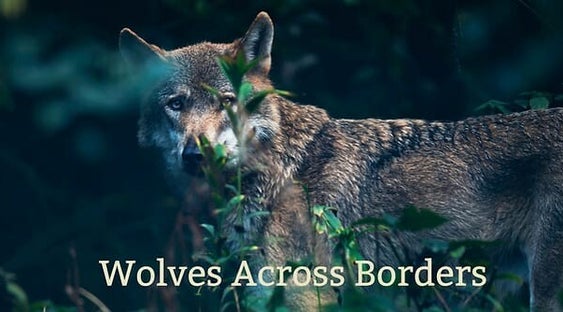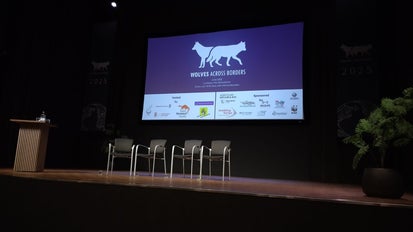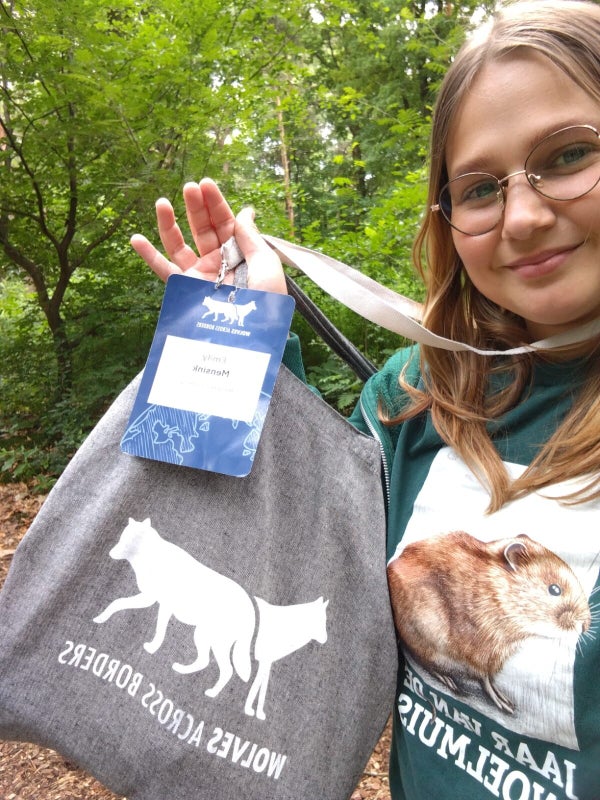
The first week of June 2025 set out to be special. After a successful first edition in Sweden in 2023, the Netherlands was now to uphold the importance of hosting such an event. On June first, I set out to a little Dutch town called Lunteren, where I booked a lovely little cabin during my time at the conference.
On Monday, June 2, I walked through the doors of conference center De Wereld in Lunteren. I was greeted with a goody bag and a badge with my name. I bought the tickets in the fall of 2024 and did not know what organization to put on the badge, so I settled on my university. I had already graduated, but I was also not part of a research facility or government position. I was at the conference out of my own curiosity and desire to keep working with big carnivores. Even though I felt intimidated by all those accomplished ecologists, scientists, and PhD students, I was excited to start connecting with new people.
After getting my first coffee of the day and greeting some acquaintances, I saw an old friend from my internship at Udine University, Northern Itlay. Knowing someone who could introduce me to some people immediately put me at ease. We caught up on life for a few minutes, and then it was time for the opening ceremony.

It promised to be a busy few days. The program was very efficient and used every minute well. Every day had a central theme: global wolves, ecology and society, policy and practice, and monitoring and management. Every day started with a few plenary presentations on those topics, and later, there were breakout sessions where you could choose different presentations, each on a topic related to the central theme of that day. I attended so many excellent presentations that I cannot share them all, but I will elaborate on a few research topics I heard during this conference in other posts.
Monday started with the opening ceremony and a presentation by David Mech, a world-renowned wolf scientist. Many people call him the founder of our understanding of wolf behavior and their ecology. David talked about his first time researching wolves and how much has changed during his lifetime of almost a century!
After an exciting first day, it was time for some fun. The organizing team thought it would be good to break the ice by holding a wolf-howling competition. It was a fantastic way to get people together and do something out of our comfort zone.
Tuesday was themed ecology and society, one of the most exciting days, in my opinion. We discussed how wolves affect society and humans' perceptions of wolves and how that can cause polarizing discussions and high emotions. To elaborate, I want to talk about a presentation by Martin Drenthen, a social scientist specializing in the wolf topic.
He described four coping strategies humans use when coexisting with wolves. Some people will say that nature belongs in "wilderness" and not in human-dominated landscapes. These people think that big carnivores do not belong closer to human settlements because they don't want to see their way of life threatened.
Another way to look at it is that the wolf symbolizes wilderness and true nature. These people do not see conflict with wolves and want everyone to make way for the rewilding of human-dominated landscapes.
The third way is to see the middle ground and want to manage nature in ways that are best for multiple stakeholders.
And the fourth coping strategy is accepting that humans must find a balance with nature and work towards coexisting. Managing will play a part, and so will just leaving nature alone.
This talk showed how polarized the debates on wolves have become, but it also offered resolutions that could benefit almost everyone. It is a beautiful example of how, from a distant view, everything can become clearer.
In the next post, I will discuss the other two days at the Wolves Across Borders conference. If you have questions or suggestions, please don't hesitate to ask in the comments.

Reactie plaatsen
Reacties